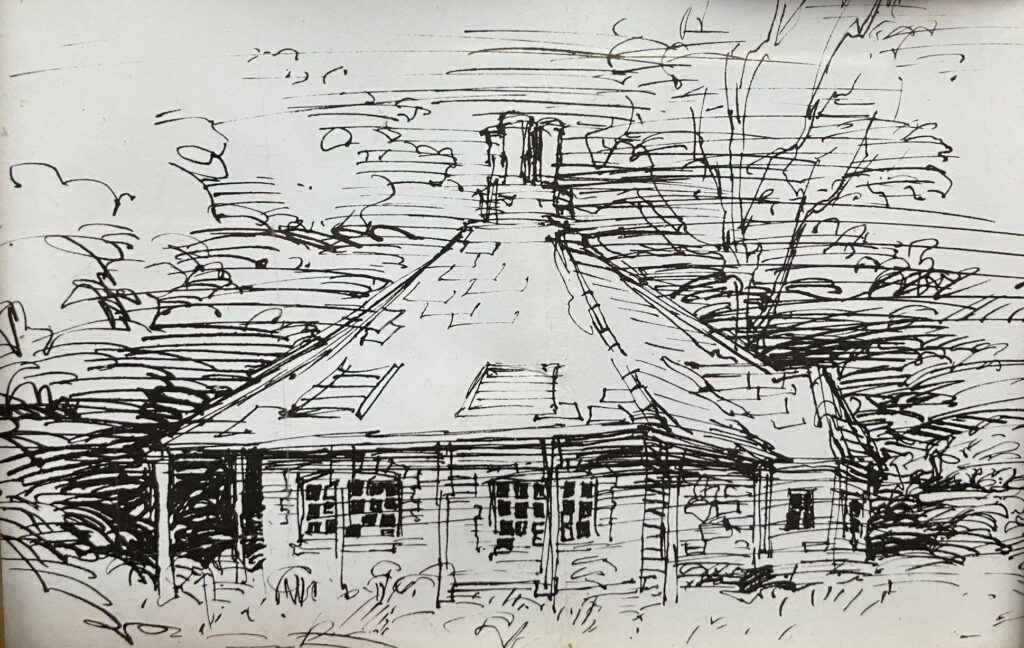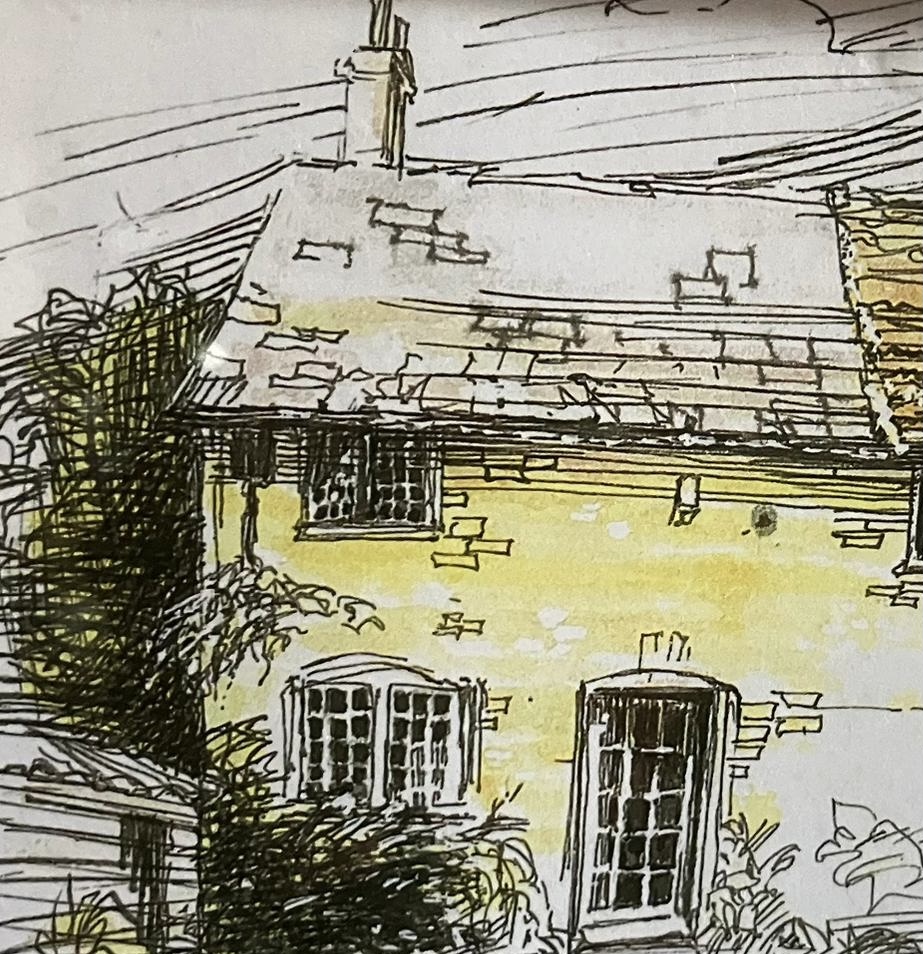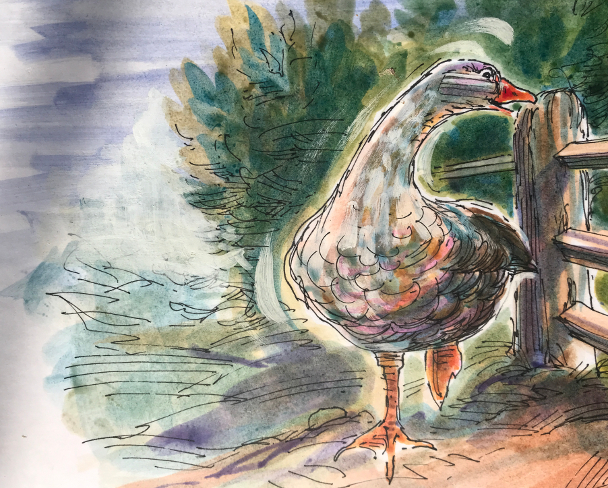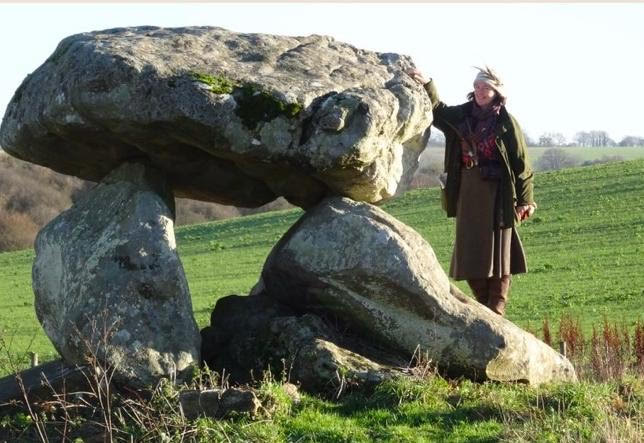by Belinda RushJansen

Grey dawn is breaking on a wild tempestuous late October Sunday. The sodden dual carriageway rolling over Dorset chalklands is thickly strewn with copper brown leaves that boisterously slap the windscreen. I leave them until my vision is almost obscured, then flick on the rapidly beating single wiper blade back-and-forth hard in rhythm with my heart.
I am heading to the hospital bed of my yet warm but deceased mother. Torn to leave my small brood still asleep in the care of their absent-minded father, this memory, this swishing of leaves in a half dark landscape beaten by rain and wind, returns as I enter the woodlands meandering track towards hidden Keepers Cottage. The silence of the white owl that drifts off the gatepost ahead in the car beam accentuates my suspension of time.
It’s seven years since that dawn journey I took to grasp whatever essence of my mother remained. And yet again I face a journey into an uncharted unforeseen chapter of my life, this time because my estranged father has also departed, leaving me his condemned thatched cottage. The children’s father will return to maintain their childhood home in the hamlet of Chettle, taking my place while I renovate day by day my father’s ruin of a home some distance away. Concerned friends have offered me their holiday cottage, Keepers, as a night base.
——————————
The small hamlet of Chettle was a picturebook of rural life. Small tractors, one red one blue, chugged through occasionally. Chattering children played on its quiet untroubled roads spinning out time on summer evenings. Older folk stopped to exchange stories and enquire about each other on their way to the tin shop that doubled as a post office with an old red phone box and letterbox and until recently a decrepit petrol pump in this self-sufficient feudal community. The tin shed shop with its loose handled door would respond to customers stepping over the gaping rotten floorboard which creaked and flexed, disturbing the bowed wood shelves stuffed with out-of-date produce. Distinct Dorset dialect chimed chattily with retired more gentrified voices.

The little church had a small ageing congregation that sang heartily accompanied by enthusiastic organ playing. We even had our own vicar who handed out sweets to encourage the children to attend. The church tower bell struck time occasionally, maintained by a retired alcoholic eccentric watchmaker camped in the basement of Chettle House, who lived like a Jenny Wren existing on the kindness of those who could put up with his difficult ways and valued his skills. Past the church were the lawns of beautiful Chettle House in its faded butterfly glory, with a still working stable of handsome hunters. A panicking left-behind pony was often heard calling shrilly with its companion donkey Henry who inflated his lungs like a bagpipe and began that extraordinary hee-haw singsong in duet.

Beyond the stables the once elegant walled garden down the now ruptured track had become an industrial site, bleak bare and timber strewn. Alive by day with saws screaming through wood fibre, cut planks clanging, trucks reversing. Fortunately, this was far away from the renowned strawberry greenhouses, the little white goatherd, the oldest thatched cottages and primrose speckled banks of Laundry lane.
When we arrived to Chettle I had a small baby. I think there was one other child in a village of mostly retired gentle folk and a few farm workers. The woman who owned the village and ran it on peppercorn rents was keen to bring young families in, and over the next few years a little gang formed. The older girls took charge, keeping the little ones in tow except once a sleeping toddler was found in a wheelbarrow parked up a lane while the gang was distracted bramble picking, or splashing in the village pond, or launching a barrel raft on the Winterborne by Eel Pits. Sometimes they would use the church to take turns playing Vicar. The ever shoaling children were less apparent as summer subsided.
Leaves fell, hedges bleached and became skeletal, mud froze as winter set in. Time to muffle up and sit it out, keep the home fires going and wait for spring and its call of ewes to lambs and cows to calves, the high haunting cry of circling buzzard, the new incessant chatter of hedgerow birds.

This cacophony of thoughts falls silent on the first night I return through Chettle Woods in late October. My children are away studying, I have a mobile phone but I’m yet to learn how to use it. At the edge of the village I enter a cusp of time led by the silent glide of the white owl on the gatepost. I strain to follow the track thick with fallen leaves that lie layer upon layer undisturbed across the forest floor, concealing muddy ruts and dips.
My path is defined only by tall beech trees that hug the edges as I snake through ever denser woodland until the last slow slippy corner when the owl vanishes in the clearing and the old gamekeeper’s cottage is illuminated in my yellow headlights.
Densely dark, I hear nothing but space. My two dogs make me thoughtlessly brave, and anyway I know this place by daylight, filled with family and laughter. I’m not afraid. I am absorbed in my thoughts of love and loss and this big life transition. I open the car door and my excited lurcher and terrier leap out with barks of excitement that shatter the nothingness of the watching night. It’s been a long first day of clearing my father’s old cottage and I must rest.
I rise early to pursue the routine of clearing, cleaning, restoring and re-making a home for our future security. It’s a big leap of faith to step away from our old home, but with the help of friends I will make my inherited cottage habitable.
That first night of my return, the gate of Keepers beckons. Fishing for the rusted key in my pocket, I enter, illuminating the inky interior as I turn on the recently installed yet gloomy electric light. I peer into the sepia recesses of the sitting room and take in its tidy order. The doors of the bedrooms I keep shut. Placing my camp bed in the middle of the sitting room, I call the dogs in, make a cup of tea in the tiny kitchen, wash the cup and replace it, then turn the key. I slip into my pyjamas and sleeping bag.
I’m soon asleep.
I wake blearily at 2am to my dogs growling long and low, listening intently. I ignore them, thinking it’s bound to be badgers. Unless it’s poachers? I keep my head down but the growling persists. When I let the dogs out they dash wildly barking to the end of the garden. Once satisfied, they return and settle for the night. I rise at dawn and journey back to my father’s home.
A curtain falls over my many echoed vibrant memories as I repeat my returns to Keepers on dark October nights.
The owl is there on its lookout post and glides me into the woods on silent wings. On entering I find a cup on the kitchen sink I must have forgotten to put away. I find this strange, because I’ve been trying to not to alter anything so I won’t have to tidy up when the family returns. Each night the dogs growl in the small hours then bark frantically and rush down the garden.
This night something happens to break into that silence when the dogs are not growling. My phone lights up! A text message. It’s 1am. I squint at the screen. A very new friend I met through a relative when delivering my eldest child to university has also recently acquired a mobile phone and is at least capable of sending a text asking how I am. How am I? I’m like an astronaut floating in space receiving a message from Earth that intensifies my isolation. But his bleep carries a glimmer of hope for happier times to come. I’m profoundly grateful for the concern.
My days become lighter, even as my nights are progressively challenging.
The third night I return for my much-needed rest to find that on one side of the tiny porch a metal watering can has been placed over the dogs’ water bowl. I’m tired, very tired, so I put this from my mind. I unlock the door and do the routine of going to bed. I rise before dawn and head off for another long day of renovations. There are many deteriorated possessions in that forlorn cottage where my estranged father lived for decades, some I remember from very early years before I lost him. Two dear friends will soon help at weekends to mix concrete, clear the debris and bring in the light. The weeks are mine to progress in between. My life opens and closes at the same time.
The fourth night I return to Keepers cottage nothing seems amiss, although I feel unsettled. The dogs do their 2am growling but I keep them inside. In the morning I get up to go as dawn breaks. The light is shades of grey. I open the front door and there, perfectly upright and central on the doormat, is an unlit nightlight candle. My logical mind says a feral cat must have knocked it off the porch shelf and remarkably it landed just so. I console myself with this logic and swiftly leave. As I eat my sustaining porridge on the camp stove at my father’s cottage, with a strong coffee to follow, wintry sunlight restoring me through grimy windows, I am jolted by a long pristine envelope that clumps through the cobweb letterbox behind me.
The first of many love letters from my new friend has arrived. I hold it like Dumbo holds his feather, with a renewed belief in a happy future. My friend too has found hope through his recent remission from critical cancer.
On the fifth night my teenage daughter is with me. We arrive at Keepers very late and after a peaceful night rise early and scramble out of the door for the long drive to her school. The following night I return. A moonless damp night.
I unlock the door.
I step through the kitchen.
I flick on the yellow light.
I can see on my tidily left pillow something that gleams palely.
I move closer.
A book. A slim children’s book with a shiny cover. At no point was I not with my daughter and no other bedroom doors have been open, so how could this book be here? The title is Perfect Pets and the picture is a large dog and a small dog that are alarmingly similar to mine. Perhaps someone else has a key…
Unnerved now that things inexplicable are happening inside the cottage, this was a step too far.
I fold up my camp bed and dog beds, and although nearly midnight I leave.
In the back of my car in a wild windswept place I feel safe and well-padded by two warm dogs who flank me. My resolution never to go back is a great relief.
My daughter has no knowledge of that book and I never mentioned the unsettled experiences of previous nights. I heard subsequently that plumbers and electricians would not work alone there. I asked my friends and they said, ‘Oh yes, we never mind because we’re all there together.’
Perhaps it was the long-gone hard-bitten gamekeeper driving out my dogs and me from his sacrosanct territory?
Keepers has been entirely rebuilt.
My daughter and her family now live in the home where she and her brothers grew up, Chafins Cottage.
My new friend on arriving with a pot of honey to my father’s restored home christened it Honeypot Cottage.
(copyright Belinda RushJansen, 2025)

About the story
At emotional turning points in our lives it can be hard to tell reality from the workings of the imagination.
While renovating a cottage to make it her home, the author encountered strange happenings in the depth of a beautiful English wood that she found difficult to explain.
About the author
Belinda RushJansen moved to the Black Isle, Scotland, as a child and lived in a remote croft on a nature reserve. Animals were the focus of her stone carving at Edinburgh College of Art.
Belinda became a member of the Royal Scottish Women Artists and was awarded the title Best Female Sculptor by the Royal Society of Arts. Her works are in public and private collections worldwide.
________
To read the other 5 commissions in Writing that Sings click here
